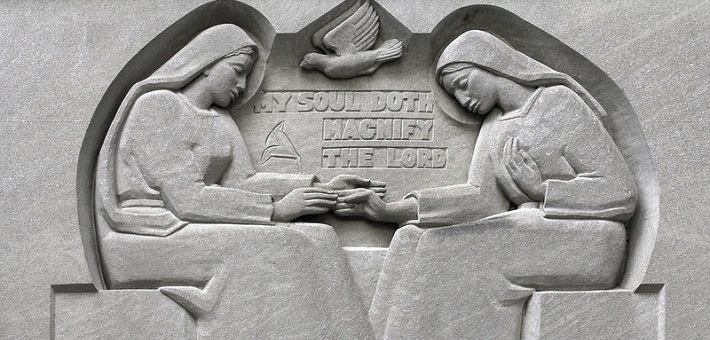Commentary on Hebrews 10:5-10
Throughout Advent we look back to the past as we reach forward to the future. Advent is the season of waiting, when we join ancient Israel in anticipation of the Christ to come.
The arrival is surprising.
A Messiah arrives who thwarts every expectation by offering his body for sacrifice rather than sacrificing Romans at the edge of his own sword.
This changes everything.
The kind of Messiah we have changes what kind of people we are. Unlike earlier revolts and victories, this king of Israel does not come to establish the right of Jews to be Jews (keeping Sabbath, eating kosher, circumcising their children). For Jesus, that’s a given.
His mission, instead, is to blow open the doors for all of humanity to be full participants in the family of God. This means that his people will be known by peace and not violence. Our ethic will be measured by self-giving love rather than keeping the Law.
If the cross is truly the means by which Emmanuel ransoms captive Israel, then we have to reimagine everything we thought we knew. We have to reread the story that came before and discover the mystery hidden in the scriptures yet too often masked by other, perhaps more obvious, interpretations.
The whole book of Hebrews is just such an exercise. It shows us how the scriptures of Israel, what we often refer to as the Old Testament, is both the voice heralding Messiah Jesus and subservient to his ultimate mission. His is the story that transforms the biblical narrative, casting everything from a new perspective.
After sacrifice
Hebrews 10 cites and interprets Psalm 40. The point is to show that the death of Jesus has done what the blood of bulls and goats cannot (Hebrews 10:4). They cannot take away sins. But the “once for all” sacrifice of Jesus’s body does (Hebrews 10:10).
One offering. Enduring through all time. Making us holy, sanctified (Hebrews 10:10, 14).
This conclusion, set in the context of the Jewish sacrificial system, contains the both/and of a biblical practice that is highlighted and then finds itself taking a back seat to a reinterpretation of the ritual. Jesus fulfills it. He brings something greater.
The earlier was the shadow. Here is the body that casts it.
Jesus is not the denial of sacrifice but its substance.
So, about Psalm 40
Psalm 40:6 provides a perfect foil for the sacrificial system. Applying it to Jesus, the first two lines differentiate between the call to sacrifice (“Sacrifice and offering you do not desire,” Psalm 40:6, NRSV) and the gift of a body that Jesus will lay down in a unique act of obedience (“a body you have prepared for me”).
There’s just one problem.
Psalm 40:6 doesn’t say, “a body you have prepared for me” (Hebrews 10:5, NRSV). Both the Hebrew version and its ancient Greek translation (the Septuagint) say something closer to, “you have opened my ears” (Hebrew) or “you have fashioned ears for me” (Greek).
The writer of Hebrews has likely changed the wording to bring the prophetic word into closer correspondence with its fulfillment. He is speaking of “when Christ came into the world” (Hebrews 10:5). And so this psalm addresses the moment of Christ’s arrival. The bodily presence of the Messiah itself becomes the vehicle for displacing that earlier form of worship.
But perhaps the most striking and stark conclusion that Hebrews draws is that Psalm 40 anticipates a division between keeping the Law and obeying the will of God. Even as Paul will relegate the Law to a place of witness to the great act of salvation that comes in Jesus (Romans 3:21), so the writer of Hebrews says that doing the will of God abolishes burnt-offerings and sin-offerings (Hebrews 10:8–10).
In Psalms 40:8 doing the will of God entailed the law being written in the heart. But for the writer of Hebrews, Jesus does something greater that abolishes the requirements of the Law. Knowing what God has done in Jesus, and its ramifications for human standing before God, the writer of Hebrews reads Psalm 40 as it never could have been read prior. Jesus changes everything.
Even what scripture means.
Advent body
Hebrews, like the rest of the New Testament, has a very specific idea of what it means for Jesus to do the will of God. It is not to “keep the Law for us.” It is, instead, the singular act of going to the cross.
The psalmist speaks of doing the will of God. Hebrews 10:10 tells us that it was by God’s will that Jesus was sacrificed. This is but one reason among many that the Christmas story for which we wait during Advent is so crucial. Jesus needs a body. A human body. More than this, he has to be truly and fully human.
God makes Jesus the right kind of being to fulfill God’s will, God’s plan to rescue humanity. It has to be an embodied person. Not just for the sacrifice made in the past, but so that the resurrected Jesus can be, as the Sacrificed One, eternally and bodily present at God’s right hand. The sacrifice is eternal because Jesus’s sacrificed body is eternal as well.
Changing everything
The incarnation we await at Christmas is inseparable not only from Good Friday but also Easter and the advent that yet lies in the future. The first arrival of Jesus transforms not only the trajectory of Israel’s story, but the story itself. At its heart, Jesus’ obedience in going to the cross reshapes for us what it means to do God’s will.
No longer do we look to the Law. We look to the cross, where self-giving love shows us the heart of God. This is the love of God for the world. It is the love of God that we are to embody in the bodies God has prepared for us.
If we would say, with Jesus, “See God! I have come to do your will!” (Hebrews 10:7), then we must be prepared to walk in the steps of Jesus. Connect the steps from the incarnation in Bethlehem through the incarnation of Jesus within each of us, to the self-giving, cross-shaped love that shows the world the face of the God whose image is borne by each of us.


December 19, 2021